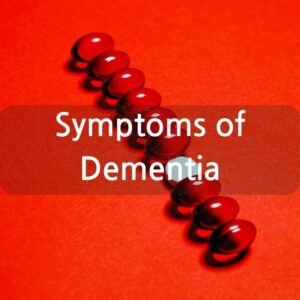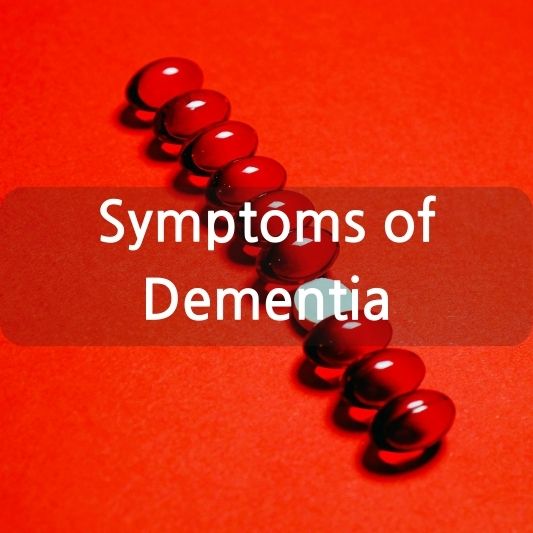Dementia is a progressive neurological disorder that affects millions of people worldwide. It’s crucial to recognize the symptoms early to ensure proper diagnosis and management. In this article, we’ll explore the various symptoms of dementia, from subtle early signs to more pronounced indicators of cognitive decline.

Introduction to Dementia
Dementia is not a specific disease but rather a term used to describe a decline in cognitive function severe enough to interfere with daily life. It encompasses a range of symptoms associated with memory loss, impaired reasoning, and changes in behavior. While dementia is most common in older adults, it is not a normal part of aging.
Understanding Dementia
Dementia can be caused by various diseases and conditions that result in damage to brain cells. Alzheimer’s disease is the most common cause of dementia, accounting for 60-80% of cases. Other types include vascular dementia, Lewy body dementia, and frontotemporal dementia.
Early Signs and Symptoms
One of the initial signs of dementia is forgetfulness and difficulty recalling recent events or information. Individuals may also experience challenges in communication, such as finding the right words or following a conversation. Confusion and disorientation, especially in familiar surroundings, are also common early symptoms.
Behavioral Changes
As dementia progresses, individuals may exhibit changes in behavior and personality. This can include agitation, irritability, and mood swings. Some may become more withdrawn, while others may display impulsive or socially inappropriate behavior. Decreased judgment and decision-making abilities are also hallmark symptoms.
Physical Symptoms
In addition to cognitive and behavioral changes, dementia can also affect a person’s physical health. Loss of motor skills and coordination may lead to difficulties with balance and mobility. Performing routine tasks like dressing or grooming may become increasingly challenging. Sleep disturbances, including insomnia or excessive daytime sleepiness, are also common.
Progression of Symptoms
Dementia typically progresses in stages, starting with mild cognitive impairment (MCI) and advancing to more severe stages of cognitive decline. In the early stages, symptoms may be subtle and easily overlooked, but as the disease progresses, they become more pronounced and debilitating.
Diagnosis and Evaluation
Diagnosing dementia involves a comprehensive medical assessment, including a review of symptoms, medical history, and cognitive tests. Imaging studies such as MRI or CT scans may be used to evaluate brain structure and function. Early diagnosis allows for timely intervention and treatment planning.
Treatment and Management
While there is currently no cure for dementia, treatments and therapies can help manage symptoms and improve quality of life. Medications may be prescribed to alleviate cognitive symptoms or address underlying conditions such as depression or anxiety. Non-pharmacological interventions, including cognitive rehabilitation and behavior modification techniques, can also be beneficial.
Coping Strategies for Patients and Caregivers
Coping with dementia can be challenging for both patients and their caregivers. Creating a supportive and nurturing environment is essential for maintaining dignity and independence. Seeking assistance from healthcare professionals and joining support groups can provide valuable resources and emotional support.
Prevention and Risk Reduction
While certain risk factors for dementia, such as age and genetics, cannot be changed, adopting a healthy lifestyle can help reduce the risk of developing the condition. This includes staying mentally and physically active, maintaining a balanced diet, managing chronic conditions like diabetes and hypertension, and avoiding harmful habits such as smoking and excessive alcohol consumption.
Impact on Families and Caregivers
Dementia not only affects individuals diagnosed with the condition but also has a significant impact on their families and caregivers. Managing the physical, emotional, and financial demands of caregiving can be overwhelming. It’s essential for caregivers to prioritize self-care and seek support from community resources and caregiver networks.
Research and Future Outlook
Advancements in dementia research offer hope for better understanding, treatment, and prevention strategies. Scientists are exploring innovative approaches, including genetic therapies and biomarker-based diagnostics, to identify and treat dementia earlier. Continued investment in research is crucial for addressing the growing burden of dementia globally.
Stigma Surrounding Dementia
Despite being a common and debilitating condition, dementia is often stigmatized and misunderstood. Educating the public about dementia and challenging stereotypes can help reduce stigma and promote empathy and inclusion for individuals living with the condition and their families.
Global Perspectives and Initiatives
Dementia is recognized as a significant public health priority worldwide, with efforts to raise awareness and improve access to care and support services. International organizations and governments are collaborating to develop policies and initiatives aimed at addressing the challenges posed by dementia and supporting affected individuals and communities.
Conclusion
Recognizing the symptoms of dementia early is crucial for timely intervention and support. By understanding the signs and seeking appropriate medical evaluation, individuals and families can better cope with the challenges of dementia and maintain quality of life.
FAQs (Frequently Asked Questions)
What are the early signs of dementia?
Early signs of dementia may include forgetfulness, difficulty with language and communication, and confusion.
Can dementia be prevented?
While certain risk factors for dementia cannot be changed, adopting a healthy lifestyle may help reduce the risk of developing the condition.
Is there a cure for dementia?
Currently, there is no cure for dementia, but treatments and therapies can help manage symptoms and improve quality of life.
How does dementia impact caregivers?
Dementia caregiving can be emotionally and physically demanding, often leading to increased stress and burnout among caregivers.
What resources are available for individuals living with dementia and their families?
There are various resources available, including support groups, caregiver education programs, and community-based services, designed to assist individuals and families affected by dementia.
